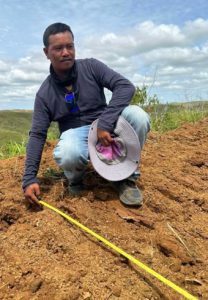IN CANDONI: How a Farmer’s Leap To Stability Provided Him New Opportunities

In the small, serene town of Candoni in Negros Occidental, farmer Jaypee Rivas, 37, has walked a path marked by quiet determination and unwavering resilience.
For Jaypee, the earth has been more than a livelihood — it has been a silent witness to his struggles and triumphs along with the unforgiving sun, tending to his family’s pineapple farm.
The burdening weight of farming
For 12 years, the Rivas family relied on the seasonal rhythm of pineapple farming. Jaypee and his wife would harvest, process, and deliver their produce to various provinces, ensuring a steady, albeit unpredictable, income.
“N’ung nagtatanim pa kami ng pinya ay iyon lang yung pinagkukunan namin ng source [of income],” Jaypee recalls. (“When we were planting pineapples, that was our only source of livelihood.”) December was a time of careful planning — the harvest provided not just for Christmas celebrations but also for the months ahead.
But the farm was vulnerable to forces beyond their control. Typhoons, fluctuating market prices, and the high cost of farm maintenance, from fertilizers to equipment, made each year a gamble. When a family health crisis struck, the cost of treatment drained their savings and left their plantation struggling. The once-thriving farm dwindled, and the weight of uncertainty grew heavier on Jaypee’s shoulders.
Taking a leap of faith
Then came a turning point. Jaypee learned about Hacienda Asia Plantations, Inc. (HAPI), a company that has established its operations in Candoni. Though apprehensive at first, he saw an opportunity to provide stability for his family. In February 2024, Jaypee joined the company as a supervisor in the Terracing Department. For him, the role was a chance to transition from farming to something different yet deeply meaningful — shaping the land for sustainable agricultural projects.
His work involves terracing mountains and installing interblocks to create harvesting plots. It’s a job that requires precision, teamwork, and care for the environment. Jaypee takes pride in what he does. “We terrace the mountains to make them more usable,” he explains. “It’s fulfilling to see the results of our efforts.”
This year marked a milestone for Jaypee: his first Christmas as an employee rather than a farmer. He shared it was different but in a good way. “Dati, ‘di naman lahat ng income namin ay napupunta sa amin kasi mayroon din kaming ginagastusan tulad ng pagtatanim ulit tsaka pambayad sa mga empleyado din namin. So, mas maganda ngayon kasi yung sahod namin ay dito lahat sa pamilya namin napupunta.” (“Before, not all of our income went to the family because we had to reinvest in the farm and pay workers. Now, our salary goes entirely to our household needs.”)
For the first time in years, the holidays felt secure and joyful. His children, aged 2 to 14, could enjoy simple yet meaningful celebrations with their parents by their side.
While his transition to employment came with its own challenges, Jaypee is grateful for the benefits and security his job provides. Through his employer, he now has access to government benefits like SSS and PhilHealth for the first time. “Balang araw ay magagamit ng mga anak namin yung mga benepisyo na binibigay samin,” he shares. (“Someday, these benefits could help my children.”)
Despite the stability, Jaypee hasn’t turned his back on farming entirely. His father continues to oversee their smaller plantation, a reminder of their roots.
Putting faith in newfound opportunity
Yet, it hasn’t all been smooth sailing. In a community that’s long been tied to independent farming, some locals view the company with skepticism. Jaypee has encountered neighbors who question his decision to work for the company. “Sinasabi nila sa akin bakit ako nagtatrabaho dito,” he says. (“They’d ask me why I work here.”)
“Sinasabi ko na wala namang masama kung nagtatrabaho ako rito kasi itong kumpanya kapag lumago ay para rin sa bayan namin, para sa lahat ng mga tao rito, yung mga walang trabaho ay makapagtrabaho.” (“I tell them there’s nothing wrong with it. When this company grows, it will benefit our town. It’s for everyone here, so that those who are unemployed can find work.”)
Looking ahead to 2025, Jaypee’s goals are simple yet profound. He dreams of more time with his family and perhaps a small break to celebrate their progress. “Baka mag day-off at mag-happy happy kasama ng pamilya,” he says with a smile. (“Maybe we’ll take a day off to relax and enjoy being together.”)
His journey reflects the quiet but meaningful transformations happening within Candoni. With the local government fostering an environment where agriculture and new job opportunities can thrive together, the town is shaping a future where locals like Jaypee can find stability without losing their deep-rooted connection to the land.
Jaypee’s story is one quiet transformation — from a farmer weathering life’s storms to an employee finding stability in new opportunities. Through it all, his commitment to his family and community remains steadfast. For Jaypee, being part of his employer’s company is more than a job; it’s a step toward a brighter, more secure future.* (PR)




Comments